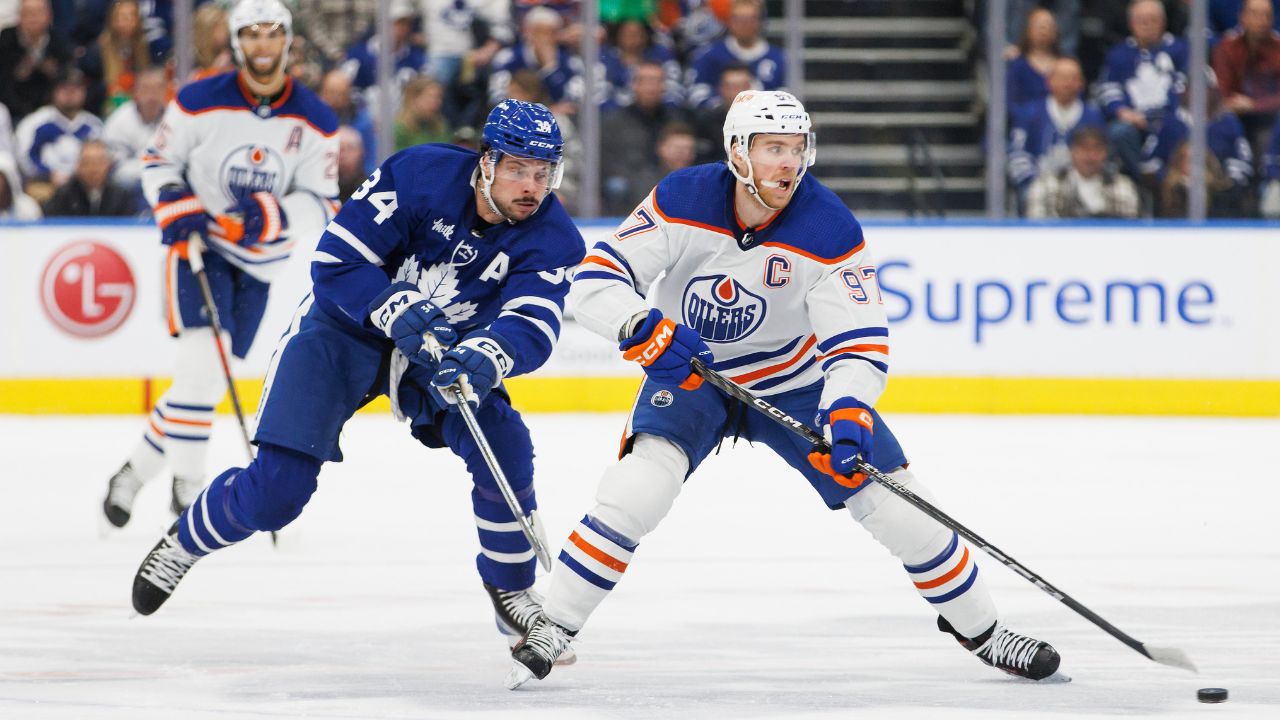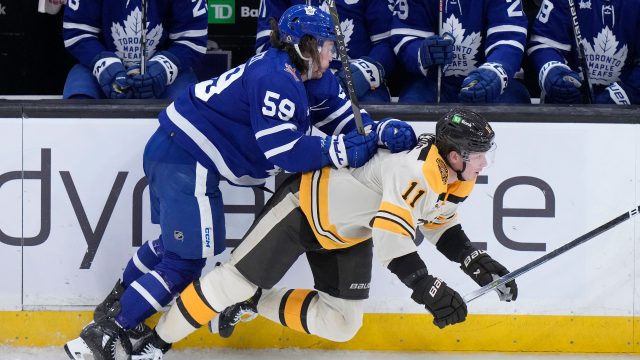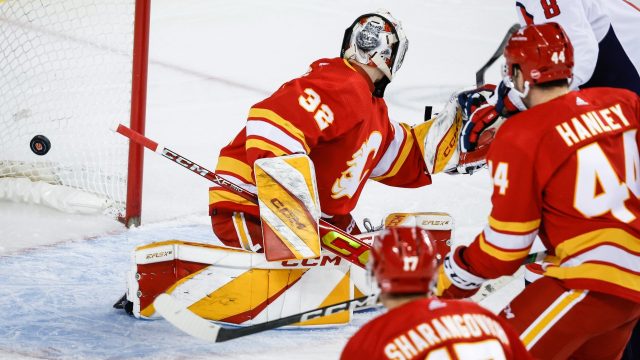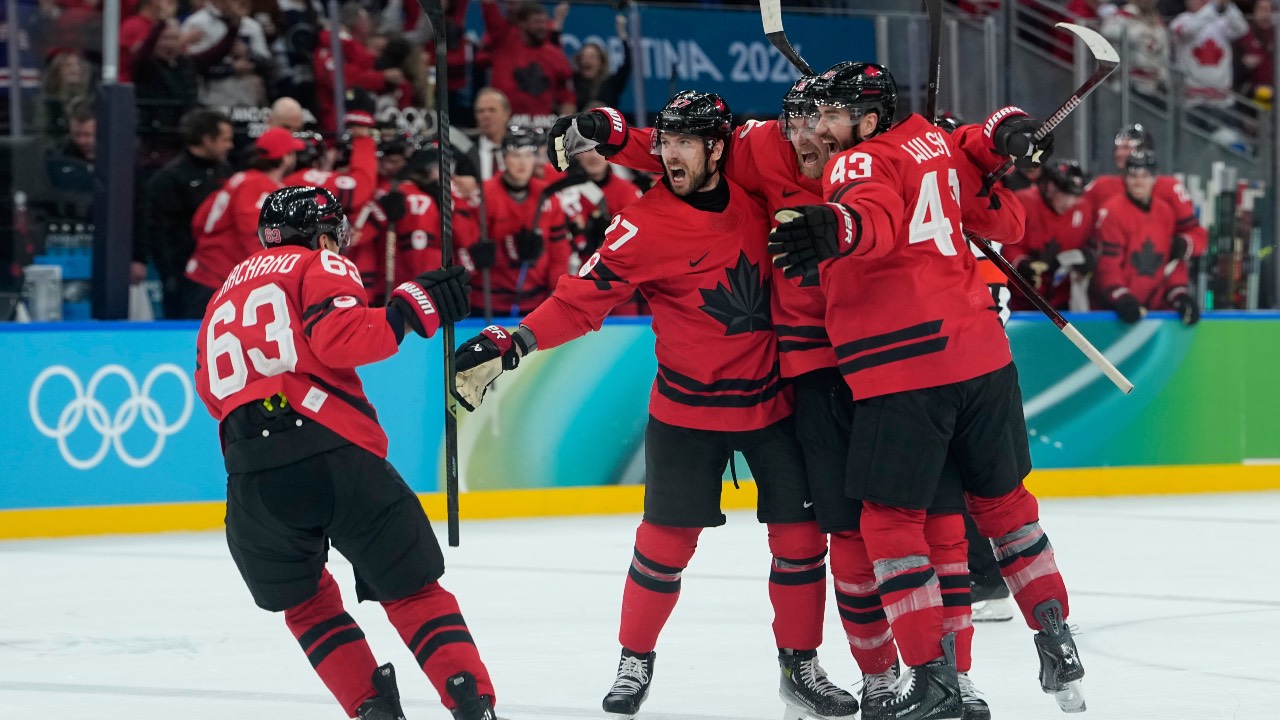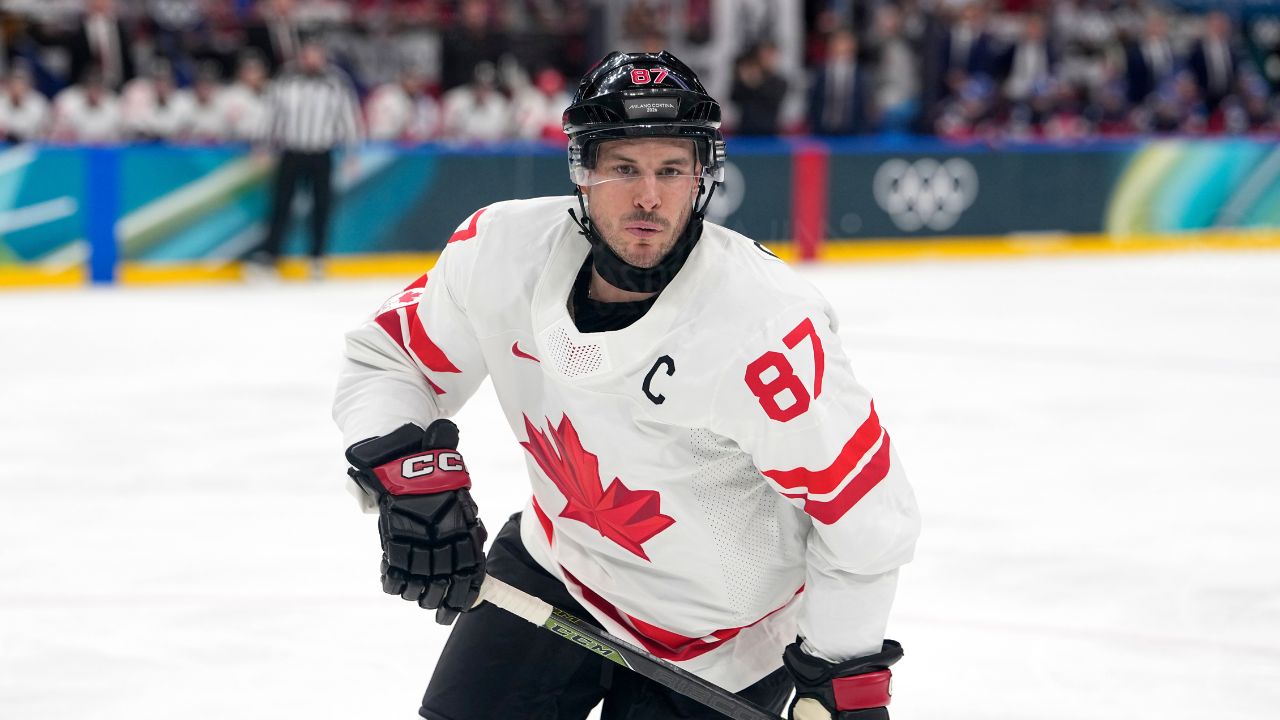
MANALAPAN, Fla. — They were the words that stuck with us most coming out of Kent Hughes’s most recent press conference, held just 40 minutes after completing his trade business for the season by officially moving Jake Allen to the New Jersey Devils and choosing to forge ahead with relatively young and far less experienced goaltenders Samuel Montembeault and Cayden Primeau.
“By and large, we’re seeing a progression,” said the Montreal Canadiens general manager, “and it’s starting to form our view of what our team can look like and what we need.”
We weren’t going to get to the heart of that over his 20-minute post-deadline debrief, where the focus would understandably be most on what had just happened rather than what was coming next.
But exactly one week later, as Hughes was winding his way through Vermont to return to his home in Boston before packing up for these meetings with his 31 colleagues in Florida, we spent 40 minutes on the phone with him to get a better sense of how he views his team and how that view is shaping his mandate to get the Canadiens to where he wants to take them.
“I feel like we’ve seen progress on the ice,” said Hughes. “I look at our team and think of the holes we had in the way we played, and we’ve seen improvements, whether it’s our power play, or, of late, our penalty kill has been better. I feel like we’ve tried to improve how we manage pucks through the neutral zone and defending the rush. I don’t think we have a simplistic way of playing, and knowing what they’re trying to teach and accomplish, we watch the games and see that there is progression.
“So, when I watch the team play now, I don’t see it like there’s 15 games left and the season’s over. I just see it like a continuum where we’re building what we’ll have in October of next season in March and April of this season. And that to me, with our young group, is extremely important.”
The next blocks the GM adds to the structure over the summer months could be just as vital to the team taking a big step forward come fall.
Hughes didn’t have to identify where he must place them. What the Canadiens need is apparent to anyone and everyone who watches them, and even the most basic statistics would inform anyone and everyone who doesn’t watch them just how badly they need it.
They rank 27th out of 32 teams in the NHL in goals per game, and they’d probably be closer to 32nd if not for their group of defencemen producing more than any other in the league for most of the season.
Five of those eight Canadiens blue-liners are under 24 years old and have accumulated more than just points over the last number of months. They have accrued the type of mileage that will enable them to make sure this is a position of strength in the near future, with other — and even more promising — defencemen rapidly rising through the system to bolster them.
Behind them, 27-year-old Montembeault has established himself as a viable starter for the foreseeable future, with a contract that will pay him just $3.15 million per season over the next three. Primeau, 24, performed well enough to push Allen out and hopes to push Montembeault as he enters his prime. And 19-year-old Jacob Fowler is authoring a standout first season at Boston College and showing potential to be a future NHL starter.
But the Canadiens have pressing needs at forward.
Sure, captain Nick Suzuki is well on his way to shattering career highs, and he remains on pace to post the most prolific offensive season by a Canadien since Alex Kovalev put up 84 points in 2007-08. And with Cole Caufield and Juraj Slafkovsky both evolving next to him, and all three of them under 25 — Slafkovsky only turns 20 at the end of this month — the Canadiens have a line that can carry their offence for years to come.
But beyond that, they have a lot of work to do to fill out the rest.
Hughes knows.
“Our roster in its current form, we understand that we need to improve our roster,” he said. “I don’t think anyone is suggesting that we don’t need to continue to get better and improve what we have.”
Whether it’s reasonable or not to expect that with the assets Hughes has at his disposal — an abundance of young, promising defencemen, four first-round picks and three second-round picks in the next two drafts, and plenty of cap space despite having 22 players under contract — he can dramatically improve the Canadiens by next fall, we’re still months from the off-season and several variables remain unsettled.
“I’m not going to say anything about expectations for next season because it’s impossible to know before we know what we’re going to accomplish over the summer,” Hughes said. “What I will say is we’re going to make every effort to continue to try and improve this team and to accelerate our timeline to get into that window where we’re competing for the playoffs, competing to win a Stanley Cup. But until we get through that summer and see what we’re able to accomplish, it’s hard for me to answer beyond that. We’ll do anything we can, but we won’t be reckless.”
Nor should the Canadiens be.
At this stage of their build, diving into the unrestricted free agent market from the high board doesn’t feel worth the risk.
Not to say Hughes should stay away from any or all forwards who might be available come July 1, it’s just that, in our opinion, it wouldn’t make sense for him to give out max dollars and term to players who are 27 or older when he’ll need their best years to line up with those of Suzuki, Caufield and other core Canadiens who will only be entering their primes a year or two from now.
But the other options Hughes has at his disposal to acquire top-six talent should keep him off the ropes and in the centre of the ring.
The Canadiens are trending toward a bottom-five finish, but even if they don’t land there in the end, they’ll still be in position to land an impactful forward. The possibility they trade for one, like they have at each of the last two drafts, is there too.
On top of that, it should feel like they have traded for one when Kirby Dach returns from the ligament tears that ended his season after just five periods of play.
At least both Dach and Hughes see it that way.
“I don’t think my physical development’s taken a hit at all,” Dach said back on Feb. 18, when he made his first media appearance since suffering the right knee injury in October. “I feel good. My body, the way I move…I was walking around without a brace two, three weeks after surgery and skating three-and-a-half months after, so I feel good there, I feel strong.”
The GM believes Dach can parlay that with everything else he’s taken from this experience to at least vault his game to where both of them thought he’d take coming out of this past training camp — another level.
“He’s missed a lot of hockey, but when I look at the kind of kid Kirby is, he’s not sitting at home feeling sorry for himself,” said Hughes. “If it was up to him, he’d probably try to come back and play before the season was over. But I also feel Kirby’s upstairs every night we play learning, watching, picking up on things and not just shooting the breeze and laughing and enjoying the in-arena experience. (Canadiens coach) Marty (St. Louis) involved him in pre-scouts.
“Look at what happened with Alex Newhook. When he was out, he was doing work with (Canadiens director of development) Adam Nicholas on some of the areas of his game that we wanted to see him improve on, and Alex has come back and been pretty good despite missing three months. I think he’s playing his best hockey to date. I’m an optimist, I believe Kirby will come back and hit the ground running. But until we see it, I don’t know.”
Coming back on Newhook, who came to the Canadiens last summer for 2023 first- and second-round picks, he’s one of the players pushing the wind in Hughes’ sails to take this project forward.
Despite missing 27 games with a high-ankle sprain that kept him out of action from Dec. 1-Feb. 10, he came back strong and has since produced three goals and nine points in 13 games from the team’s second line. The 23-year-old, who’s most likely to be the best version of himself on one of Suzuki’s or Dach’s wings, appears as comfortable as he ever has at centre, where the Canadiens need him right now.
“I’ve known Alex Newhook as a hockey player for a very long time,” Hughes said. “I’ve seen him play since he was 16 years of age, and I know what’s inside of him and what his potential is, but also know there were holes in his game. And holes are way more evident in the National Hockey League than they are in a junior league when you’re 16, or in college hockey when you’re 18. But we’re seeing those holes get patched up. And with confidence, because confidence is so critical, you’re seeing a better hockey player in March than we even saw in November.”
What he’s seeing in the progress from 20-year-old Joshua Roy, who’s lining up nightly with Newhook, is keeping him from giving the Laval Rocket an offensive push they could desperately use as they sit three points back of a playoff spot with 12 games remaining in their season.
“This guy is showing that he’s NHL calibre,” said Hughes. “There have been ups and downs within a game and from game to game, but it’s encouraging what we’ve seen of him. And that’s again this balance between trying to do what’s best for Josh, trying to do what’s best for Laval and trying to do what’s best for Montreal, and in that picture, he’s still up with us. He won’t stay up with us the whole year, but it indicates that we want to continue to see him, and we want him to continue to experience games and life in the National Hockey League for a little bit longer.”
Because Roy’s individual progress, and that of any of his young teammates who appear to be members of the Canadiens core moving forward, is as encouraging as the progress of the team as a whole.
St. Louis has done a masterful job not only overseeing it but also coaxing it along on both fronts, slotting Roy into the role he should one day fill more permanently and, with help from Nicholas and the development staff, giving Slafkovsky his best opportunity to continue growing on the curve you expect a player chosen first overall to grow on.
Hughes believes the exposure they, and the other core pieces of the Canadiens, have received is fundamental to them being able to deliver when the team is expected to be far more competitive.
“I think we should improve internally, naturally,” Hughes said, “but I also think people talk about how important it is to gain experience and learn from it, and that’s what they’re getting. They’re getting 38 one-goal games to this point of the season.
“Thinking about anything we’re accomplishing, who’s factoring in this: How important are younger players becoming to the product on the ice? That’s important to us. We have the same results as a season ago, but the players who are contributing to the progress within the games are younger players, and that to me is a sign of progress. Those young players have to be able to eventually shoulder the responsibility of bringing this team where it wants to go, and we’re going to add more young players to do it. But the ones here have to continue to do that. We’re seeing that. Last year, we had the same record, but Slaf wasn’t a significant contributor to whatever success we had relative to what he’s doing this year. The same could be said of others.”
What it’s doing for the collective is equally important.
The kids are growing together, pushing each other to become the most complete versions of themselves but also pulling for each other to become the most complete team they can be.
There’s a balance in there that’s essential to becoming a winner.
“I don’t want to say we’re there, because it’s something that you have to continue with, but I do believe that we’re in the process of building a strong culture,” Hughes said. “If you think about a team professional sport like hockey, where one guy’s on the power play and another guy’s not, the guy who may see himself as a power-play guy but doesn’t have the opportunity to be on it, in a completely self-serving way, could say, ‘This sucks, I’m not pulling for this guy and he’s costing me money.’ There is that inherent push-pull in team sports and certainly in professional sports. But when you have a group more willing than others to put their individual interests aside for the benefit of the collective, when you build that, when they care and they want to work every day towards the common goal and wanting to win — even when they’re out of the playoffs — I think it goes a long way. It’s not just assembling the most talented group of hockey players that allows a team to win.
“And it runs deeper than just the dressing room; it’s organizationally. We’re all working in that direction, with everyone pulling and bought in. That’s a week-to-week, month-to-month, year-to-year thing. Can’t say, oh, we’ve done it and therefore always will. We have to keep going.”
Hughes’ task is to maximize the assets he has to not only keep the Canadiens on track but push them up the pack.
He’s managed things well over his three-year tenure at the helm, but his biggest moves still lie ahead. What he’s seen should propel him to start making them.


